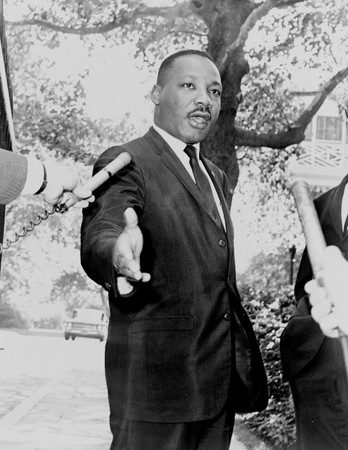News
Martin Luther King's greatest labour speeches

On the anniversary of his “I have a dream” speech, we take a look at Martin Luther King's greatest speeches on labour rights and economic equality.
I’ve been to the mountaintop
The night before his assassination in April 1968, King addressed a group of striking sanitation workers in Memphis, Tennessee. 1,300 workers were taking action and King believed their struggle exposed the need for economic equality and social justice throughout the U.S.
“The nation is sick. Trouble is in the land. Confusion all around,” King told his audience. “That's a strange statement. But I know, somehow, that only when it is dark enough, can you see the stars.”
“Now we're going to march again, and we've got to march again, in order to put the issue where it is supposed to be,” he urged.
“We’ve got to give ourselves to this struggle until the end. Nothing would be more tragic than to stop at this point, in Memphis. We’ve go to see it through.”
Bold struggles
In his address to the Illinois State Convention of the American Federation of Labour and Congress of Industrial Organizations, King pointed out the similarities between the trade union movement and the civil rights movement and recalled what unions had achieved in America to date.
"The labour movement was the principal force that transformed misery and despair into hope and progress. Out of its bold struggles, economic and social reform gave birth to unemployment insurance, old-age pensions, government relief for the destitute and, above all, new wage levels that meant not mere survival but a tolerable life,” King said.
“The captains of industry did not lead this transformation; they resisted it until they were overcome. When in the thirties the wave of union organization crested over the nation, it carried to secure shores not only itself but the whole society."
“Civilization began to grow in the economic life of man, and a decent life with a sense of security and dignity became a reality rather than a distant dream.”
“It is a mark of our intellectual backwardness that these monumental achievements of labor are still only dimly seen, and in all too many circles the term “union” is still synonymous with self-seeking, power hunger, racketeering, and cynical coercion. There have been and still are wrongs in the trade union movement, but its share of credit for triumphant accomplishments is substantially denied in the historical treatment of the nation’s progress.”
New Horizons
Martin Luther King’s speech to the United Automobile Workers Union at its 25th anniversary convention was made before 5,700 union members and guests.
“Because you persisted in your quest for a better life, you brought new horizons to the whole nation.”
"Industry after industry was compelled to civilize its practices and in so doing benefited themselves along with you. The new unions became social institutions, which stabilized the nation, fortified it, and thrust it up to undreamed of levels of production.”

